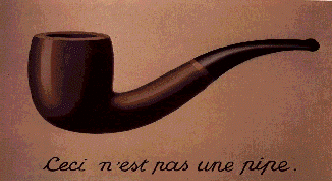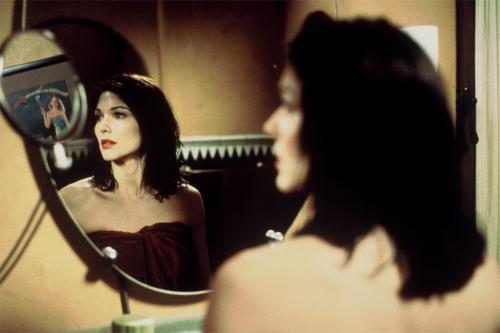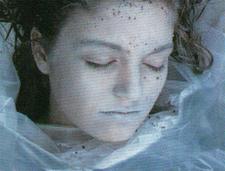May 03, 2004
THIS IS (NOT) THE GIRL
David Lynch versus Dennis Potter....
The affinities between the work of David Lynch and Dennis Potter have often been remarked upon. No doubt they would have been confirmed if Lynch and Potter’s long-planned collaboration on an adaptation of D. M. Thomas’s The White Hotel had come to fruition.
Superficially, the works of Potter and Lynch which have most in common with each other are Twin Peaks and The Singing Detective; both are explorations of the detective genre by televisual auteurs; both display their authors’ signature obsessions with popular culture; both examine the interplay between sexuality, memory and identity – but the most Potteresque of Lynch’s films is actually his masterpiece and most recent feature, Mulholland Dr. In cross-fertilizing the soap, detective and Horror genres (amongst others), Twin Peaks contaminated realism with strains of the marvellous. Yet its concerns were epistemological (‘Is this real or not?’) rather than ontological (‘What is reality?’ ‘What is the reality of this?’) Mulholland Dr, meanwhile, like The Singing Detective, is reflexively engaged with its own fictionality.
The ‘standard’ interpretation of Mulholland Dr claims that its first two-thirds are the fantasy/ dream of failed two-bit actress Diane Selwyn, whose actual life is allegedly depicted, in all its quotidian squalor, in the final section of the film. This would underscore MD’s striking similarities to The Singing Detective, whose complexly-interacting narrative lines are weaved from the fantasies and memories of the convalescent pulp author, Philip E Marlow (Michael Gambon). Yet such a reading is ultimately unsatisfactory. As Timothy Takemoto argues, (you have to scroll down to his piece, ‘Double Dreams in Hollywood’) to see the second part of Mulholland Dr as real is inherently conservative in its assumption that there is an unambiguous reality to which we can ‘return’.
Following Zizek, Takemoto suggests that what MD presents is not an exposed ‘reality’ but a ‘grey fog’ of competing, incommensurable realities, from which desire and will are never extricable. (An homologous case is Kubrick’s near-contemporaneous Eyes Wide Shut, which is standardly interpreted as entirely the dream of the protagonist, Tom Cruise’s Bill. What this reading of Eyes Wide Shut has in common with the dominant readings of Mulholland Dr is a confidence in the possibility of parsing reality from desire, a distinction which both films disturb, as the very title of Kubrick’s film indicates).
Lyotard famously defines postmodernity as an ‘incredulity towards meta-narratives’ If the standard interpretation of MD were valid, then, far from being incredulous towards meta-narratives, it would be presenting a meta-narrative (an empirical realism focalized through a psychological interiority).
In his earlier Libidinal Economy, Lyotard opposes ‘the representational cube’ to the Moebian strip: a single-sided figure, with no inside or outside.
In tracing the endless surface of this moebian strip, both Lynch and Potter exemplify a libidinal postmodernism diametrically opposed to self-conscious, auto-referencing ‘PoMo’. Whereas PoMo mourns the absence of a stable transcendent plane, a meta-space ‘above’ the fiction, typically identified with a self-present, self-conscious subject (God/ the author…), Lynch and Potter’s fiction explores the Escheresque flatness of a plane of immanence. Far from being metafictions, then, Potter’s and Lynch deny the possibility of any meta level.

The Real of Mulholland Dr is not Diane’s supposedly waking world, but the paradoxically entrancing insomniac realm of Club Silencio (which, in acting as the gateway from the first section of the film to the second is like the ‘cut’ of the moebian band that when sutured together, transforms the two sides of the piece of paper into a single strip). I say ‘paradoxically entrancing’ because the scene is ostensibly demystifying. Yet only ostensibly so; like Magritte’s ‘This Is Not a Pipe’, Club Silencio, reminiscent of the Black/White Lodge in the first and final episodes of Twin Peaks and as intensely charged as anything in Lynch’s oeuvre, demonstrates film – and art’s - irreducible sorcery. Club Silencio’s scenario is thoroughly Potteresque. The entertainment is provided by perfomers who mime onstage to a pre-recorded soundtrack, much in the way that Potter had the characters in The Singing Detective and Pennies From Heaven lip sync to thirties’ pop. Despite the complete ingenuousness of the magician-compere’s words – ‘There is no band. What you will hear are recordings.’- we (the audience) are nevertheless unable to resist the seduction of the spectacle. So when the apparent singer, Rebeka Del Rio, collapses but the music continues, we are shocked. Something in us compels us to treat the performance as if real.
It would be difficult to conceive of a more compelling parable for postmodernism. Just as Postmodernism simultaneously exposes and disturbs generic conventions whilst also participating in their ‘lure’, so the Silencio audience is made aware of the artificiality of what they are experiencing at the very moment that they succumb to it. (See here for an analysis of this in relation to Twin Peaks and The Singing Detective
There is of course nothing less mendacious, less dissimmulatory, in cinema’s history of illusion than the scene in Club Silencio. What we are seeing and hearing – the film itself - is a recording and nothing but. On the most banal level, this is the Real which the ‘magic of cinema’ must conceal. Yet the scene haunts for reasons other than this. It challenges the audience (us!) to recognize that our own lives, the roles we perform when we leave the auditorium, are themselves recordings, scripted by forces outside the self whose ‘substance’ turns out to be itself nothing more than a palimpsest of influences.
Lip syncing is a model for a subjectivity that is essentially empty; that is driven, not driving; that is a rendition, not an origination; whose inside, like that of the moebius band, is all outside. Watching Club Silencio I’m reminded of Philip K Dick’s gnomic but suggestive remark that ‘life is not lived, but lived through.’
(It’s worth noting parenthetically here that both Potter and Lynch are most at home with pre-rock pop. Potter famously fills his soundtracks with the wistful tearoom pop of his childhood, while Lynch favours Badalmenti’s oneiric jazz or Julee Cruise’s ethereal doo-wop. Even when the music is chronologically of the rock era, it is temperamentally pre-rock – Lynch’s favourite, Roy Orbison, for instance, although supposedly a rocker, was always a crooner at heart. Not coincidentally, Lynch and Potter are at their least convincing when trying to deal with rock – Potter’s dawn-of-rock opera Lipstick On Your Collar and Lynch’s rebel rocker fantasy Wild At Heart are amongst their weakest work.)

Mulholland Dr shares much with the television serial Potter wrote after The Singing Detective, the troubled Blackeyes. Blackeyes, whose protagonist, Gina Bellman, physically resembles MD’s Laura Elena Harring, was intended to be Potter’s examination of the production and manipulation of female subjectivity (and his own desiring-complicity with this manipulation). The Lynch female – like the Potter female (and the Ferry female, come to think of it) – is a largely fantasmatic concoction of blood-red lipstick, nail polish, high heels and long hair. Tellingly, the iconic image of both Lynch’s Twin Peaks and of Potter’s The Singing Detective is a dead woman (Laura Palmer wrapped in plastic; Sonia/ Philip’s mother dredged up from the Thames under Hammersmith bridge), just as Mulholland Dr revolves around a female corpse.
But in situating women as both dreamers and the dreamed, MD's examination of the desiring-trajectories of Hollywood’s factory of dreams, succeeded in a way that Blackeyes never did.
Posted by mark at May 3, 2004 09:52 PM | TrackBackAbsurd really, Karaoke and Cold Lazarus are the only Potter pieces I've seen, both at an age where I don't really think I got much out of them anyway.
I agree wholeheartedly with your views about the Club Silencio scene in MD; it is probably the most unashamedly cinematic and thus artificial moment I've ever seen on film, and works so well because it is not a revelation that comes to you in the thoughful hours after seeing the film, but because you cannot avoid understanding this at the moment the singer falls.
Posted by: Philip at May 3, 2004 10:55 PMYou're lucky, Phil, in a way --- all those Potter masterpieces to look fwd to! Most of us Potter admirers were embarrassed/ crestfallen abt Karaoke and Cold Lazarus. But you shouldn't put off watching TSD or Pennies From Heaven any further, I promise you....
Yeh, the Silencio thing is amazing; exemplifies everything that's compelling about Lynch and Potter; when they break the frame it makes what they do MORE not less intense .... Unlike stupid wittering on abt 'texts' or whatever....
Posted by: mark k-punk at May 3, 2004 11:41 PMyo Mark i've never grappled substantively with anything Potter so 'spose i'm in for a treat?
Club Silencio scene wonderful but haha = scene w' bag swirling in American Beauty.
Definitely Scott....
Not sure what yr saying abt the American Beauty scene....
Posted by: mark k-punk at May 4, 2004 01:39 AMmischief mischief!
thankfully k-punk's words not living in Middlebrow Cynic Petridis-type Land, Amer. Beauty comparison need not apply...
Posted by: scott at May 4, 2004 01:53 AMnot sure i agree with the idea that standard postmodernism "mournss the absence of a stable transcendent plane". I'm no kind of expert on this, but doesn't the Derridean idea of postmodernism revolve joyously around the endless deferral and difference of meaning? Derrida's idea of "jouissance" seems to me an apt prism through which to see Lynch's work; meaning is always elsewhere; realities are interchanged summarily; all is self-consciously performed and performative; there is no stable underlying plane of reality. I think 'Lost Highway', which was not particularly well received, is actually the most extreme example of this in Lynch's work. The total shift of identities occuring exactly halfway through the film is a self-reflexive comment: art is performed as are identities - there are no governing rules that determine either should or could be static. Another fundamental related point occurs in Blue Velvet. When Kyle M and Laura Dern are sitting in the car, having just been exposed to the dark psychosexual world inhabited by Isabella Rosselini and Dennis Hopper for the first time, they eulogise a world now lost of comforting lawns and hedgerows. The speech stands out so starkly because this prelapsarian world never existed in the first place - all is flux in darkness. Ultimately, Lynch's work ironises the view that anything other than multiple, shifting existences can or have occurred. But it doesn't bemaoan these quicksands - rather it takes joy in their ephemeral beauty. My gut reaction to all Lynch's films is always that they're a vision or road to transcendence.
Posted by: Jon at May 4, 2004 12:58 PMi really enjoyed MD Mark, kinda kinship with Memento in a very general way bleh bleh, but you think it's his masterpiece?
wow.
i dunno, i guess i'm just always impressed by ballsy definitive claims (as i remember saying at I Feel Love cmmts box once)...
Posted by: scott at May 4, 2004 03:32 PMAlso, I'm with you in looking for a little critical rehab for 'Eyes Wide Shut', I thought it was dismissed far too quickly (Kidman's dire performance aside)... I loved the film's nightmare logic, the way the absurd seems inevitable, and things are linked not so much by Cruise's blundering detective work, but by the underlying assumption that of course things are linked, they always will be.
Posted by: Philip at May 4, 2004 06:57 PMPhil
I'd actually put EWS in my top four Kubrick films; after Barry Lyndon (the absolute peak), The Shining and 2001.
There's actually a great deal in common between MD and EWS.
EWS is definitely Kubrick's most Kafkaesque film; the scene in which Cruise stumbles upon those two Japanese guys in the back of the costume shop with the owner's daughter is PURE Kafka.
I like the idea that the message handed to Cruise outside the gates at Somerton - 'give up all your useless attempts to understand what is happening' - is effectively addressed to the audience.
But yes, Kidman's performance, I'm afraid, is simply awful. (Who can recall that stoned scene without cringing?) Cruise, meanwhile, is great.
Jon:
Derrida isn't what I'd call a postmodernist and wasn't what I was referring to; I was thinking more of a kind of reflexive practice (meta-fiction, meta-culture). But - and I know very little about Derrida too - my understanding of his work is that it is in a way motivated by an absent transcendent space (the signified). Jouissance is a concept I'd associate more with Lacan (and feminist take-up of JL) than with Derrida....
Zizek makes great play of the kind of idyllic scenes you refer to, arguing that we should see them as integral to Lynch's work, part of what Z calls the 'ridiculous sublime'.
You'd have to substantiate yr idea that Lynch's films are about pursuing transcendence, I don't see it myself....
Scott
Yeh, there's no doubt that MD is Lynch's masterpiece as far as I'm concerned; I don't see anything else in his oeuvre that can touch it.
Posted by: mark k-punk at May 4, 2004 07:32 PMMark
fairy nuff.
it's not like i've got one sixteenth of your intellectual firepower to argue back with; i've just got a ken for Eraserhead.
actually, the really bold critical move would be, of course, to argue vigorously for The Straight Story...
oh, couldn't agree more w' you about the obvious supremacy of Barry Lyndon btw.
P.S.
i never actually saw EWS. TBH i'm not really that bothered too either though. am i being terribly mean?
i do like Nicole Kidman (well, in things like The Hours and that one where she's a ghost but don't realise it for a bit and that one where she plays a weathergirl who bumps off her hubbie Matt Dillon, she's, well, okay). but your descriptions of her awfulness in said film are not endearing me...
P.P.S.
is Kidman's best thing still being oppo' the bonkers Zane in Dead Calm? i have a terrible memory for these things. it certainly isn't Far & Away.

